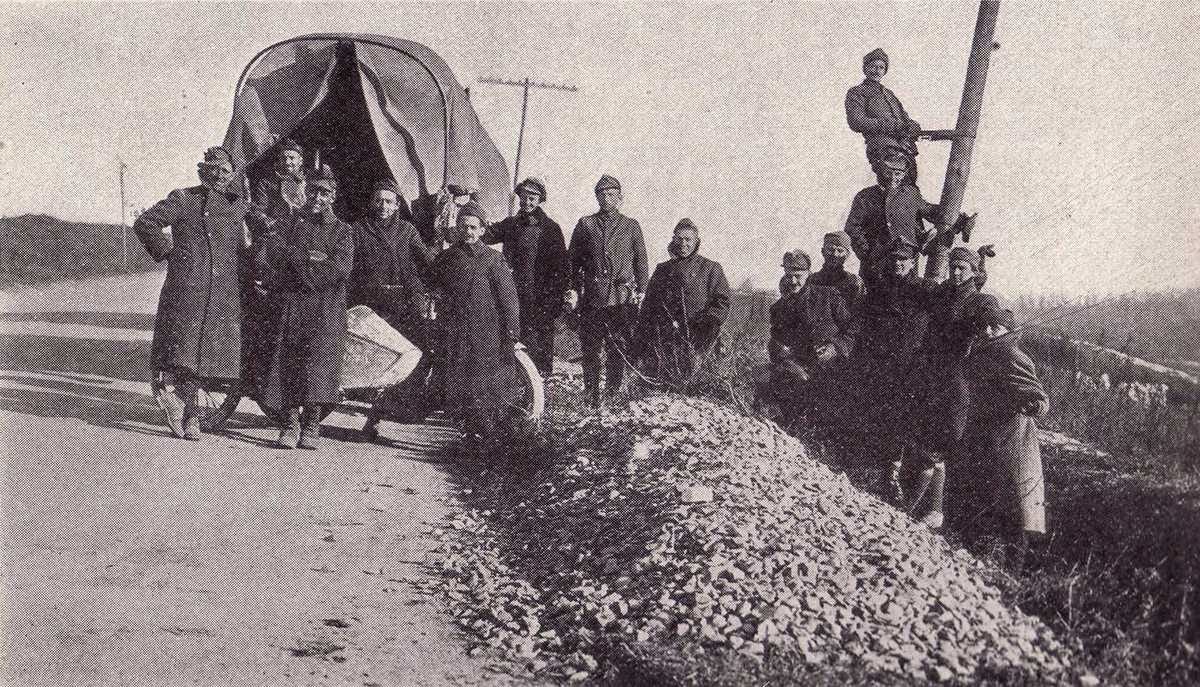 |
| George Rutherfurd |
World War I was drawing to a close, but its biggest battle was still on the horizon. George Rutherfurd and the other members of the 411th Telegraph Battalion were in eastern France setting up the communications network necessary to support the Meuse-Argonne Offensive. Again, I'll quote from "Memories of the 411th Telegraph Battalion In the World War Here and 'Over There'" by C.H. Moore to illuminate George's experience.
On September 24th our Battalion began the construction of a ten wire lead from Bois Foucheres through Recicourt in a northwesterly direction to the edge of the Forest de Hesse, and by working every available minute of daylight, hauling and distributing material at night, had completed the lead to the edge of the forest which was just behind the German front lines during the night of the 25th. (p. 107)
From there, the lines were extended to Avocourt. All of this was accomplished on a very tight schedule and in challenging conditions.
The building of this lead across the old "no-man's land" north of Avocourt through the Forest de Montfaucon to the "water-hold" south of Montfaucon, constituted a task which tried our men to the very limit of physical endurance. Performing the very hardest kind of work in lugging materials long distances over shell torn fields and woods heavy with mud and water, covered with almost continual rain, sleeping in recently evacuated German dugouts filthy with vermin and rats, living on scant food owing to difficulty in bringing up supplies, subject to scattering shell fire in the day time and air raids at night, these men accomplished results worth enough to be chronicled alongside of the many brilliant exploits further to the front in that long battle. (p. 107-108)
George was fortunate that his role as an officer kept him out of rat-filled trenches. He often went ahead of other members of the Battalion, driven in a motorcycle sidecar, drawing out a route for the communications and relaying those plans back to the Battalion. At night, he and his driver sought rooms in local villages and relied on townspeople to feed them. Sometimes, they went through villages that had been reduced to rubble in battle. In one of these towns, a church had been bombed. George found a register of village marriages and births in the ruins, and took it with him so it would not be destroyed by the elements. It took some years after the war ended to get it back to the village, but George managed to do so. I like to think some French genealogists have been very happy to find that not all records from that area were destroyed in the war.
 |
| Telephone lines built by the 411th before and during the Meuse-Argonne Offensive |
The Allied forces were victorious in the Meuse-Argonne Offensive, and on November 11, 1918, Armistice was declared. The members of the 411th were jubilant at the news.
A short time after the Armistice we were informed that the First Army headquarters was not going on into Germany and that after a few days work, completing work under way, we would be moved back into a rest area. And shortly thereafter we started down the Meuse Valley to Verdun, the trip being made after dark. We will never forget that trip; it was a bright moonlit night. The camp fires of troops resting for the night lighted up the landscape and completed the naturally beautiful picture. It was the first time in over four years that the soldiers had had the privilege of fires at night and they were indulging it to the limit. There was light aplenty without the moon, for on all sides the victory celebration was still in progress, and the shells and vari-colored flares lighted up the sky for miles and miles. And everybody was happy; the old tenseness was gone; in its place was hilarious laughter and spontaneous raillery hurled at each other and passers-by. (p. 124)
 |
| Members of the 411th outside Verdun on November 20, 1919 |
The new headquarters for the 411th was established at Fravaux. There, they settled into a camp life of drills and study, hoping they'd soon be sent home to America. At Christmas, an elaborate dinner was served, followed by a musical performance, a film and a visit from Santa Claus. The local villagers were invited and a good time was had by all. In February 1919, the 411th was sent to a new headquarters at Montlouis, a small village just outside Tours, in the Loire Valley. There, they worked to repair damaged telephone and telegraph lines in the area. Finally, in March 1919, word came that the 411th was going home.
 |
| Some of the men of the 411th Telegraph Battalion |
On April 10, 1919, the 411th Telegraph Battalion departed Brest, France on the U.S. Cruiser Charleston. They arrived in Hoboken, New Jersey on April 21, 1919. After an eight day stay at Camp Mills, they departed for California and arrived in San Francisco on May 5, 1919. Nearly fifteen months after they had sailed to war, they were home.
George was about to meet his daughter for the first time.
No comments:
Post a Comment